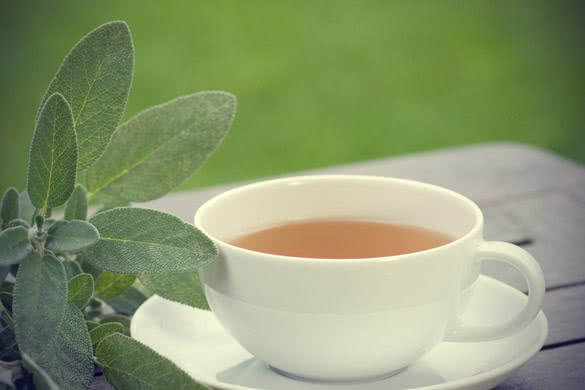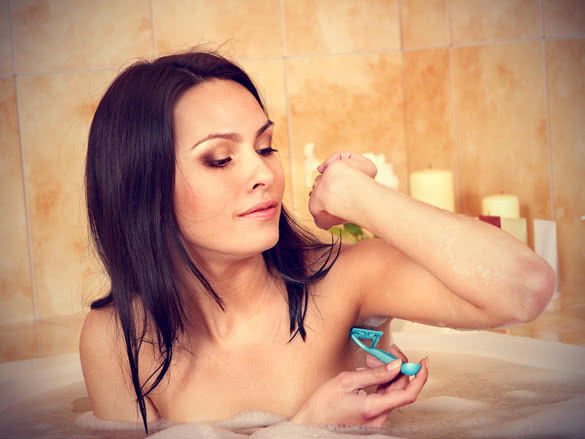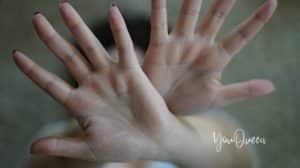Sweating is a normal physiological process that helps regulate the body’s internal temperature.
1. There are more than 2 million sweat glands located under human skin. When your body heats up due to warm weather, exercise, spicy foods, stress, etc, these glands release moisture and send it to the surface of your skin. When sweat evaporates from your skin, it removes excess heat and restores your body temperature to normal.
2. Apart from having a cooling function, sweating also cleanses the skin and helps remove toxins from the body.
3. Sweat consists of water, salt, and electrolytes and it basically odorless. Body odor occurs when sweat mixes with bacteria that live on your skin’s surface. Fortunately, there are many ways to prevent this unpleasant scent.
4. Abnormal or excessive sweating can be caused by numerous factors and it is referred to as hyperhidrosis. Hyperhidrosis affects about 1% of the global population and it mainly targets armpits, palms of the hands, soles of the feet and genital areas. In some cases it may affect even the entire surface of the skin.
There are Numerous Ways to Stop Excessive Sweating?
That’s right. There are many ways to avoid excessive sweating, ranging from natural remedies and personal hygiene habits to medical prescriptions and treatments. Read on to discover some of the most efficient ones.
Watch What You Eat
Avoiding certain foods and eating the right ones can significantly help control excessive sweating.
Foods to avoid include spicy dishes, garlic, onions, processed and high-sugar foods, and foods with a high concentration of hydrogenated oil. These foods stimulate your sweat glands, causing excessive perspiration.
The consumption of chemical toxins found in processed foods can also trigger an increase in sweating as your body will try to eliminate these harmful substances through your sweat glands.
Following a healthy diet filled with fresh fruits, vegetables, whole grains, fish, and moderate amounts of lean meat, can instead help you as these foods make your body produce less sweat.
Reduce Your Caffeine Intake
Caffeine can over-stimulate the central nervous system, cause the release of adrenaline into the body, and raise your internal temperature. This causes your body to sweat.
Avoid Hot Drinks and Drink Plenty of Water
1. Drink a lot of water. Water helps regulate body temperature. When you are hydrated, your body temperature is low and you sweat less. You should drink at least 8 glasses of water a day and never allow yourself to get thirsty.
2. Hot drinks can considerably aggravate sweating. Reduce them or completely replace them with cold beverages.
Drink Sage Tea
Sage is one of the best natural remedies for treating excessive sweating. It has been used for centuries to treat night sweats and menopause-related hot flashes. It has powerful astringent compounds, which help reduce excessive perspiration.
Drinking sage tea or taking sage capsules will normalize the activity of the sweat glands, as well as soothe your nervous system.
Drink Tomato Juice and Eat Grapes
Tomatoes and grapes are loaded with antioxidants, which help eliminate toxins that cause your body to sweat excessively. They also regulate your internal temperature and keep your body from overheating.
For best results, drink one glass of fresh, pure tomato juice every day for one whole week, and then continue every other day.
Grapes can also naturally cool down your body and thereby reduce sweat. You may either drink fresh grape juice or eat 10-15 grapes each day.
Eliminate Alcohol and Nicotine
They stimulate the release of adrenalin, which can lead to a great deal of sweating. They are also very toxic.
Take Natural Supplements
There are numerous natural supplements and remedies that can be used to treat excessive sweating. They include lecithin capsules, zinc, vitamin B complex, brewer’s yeast, essential fatty acids, vitamin C and vitamin E.
Try Over-the-counter Antiperspirants
Deodorants contain fragrances that cover up body odor, but they don’t help with sweating. Antiperspirants are instead specifically formulated to prevent underarm perspiration.
There are different kinds of antiperspirants available in drugstores and most of them use aluminum chloride, a compound that temporarily blocks sweat pores. They are usually more efficient than others that do not contain it.
Antiperspirants can be found in different forms: squeeze bottles, sticks, roll-ons, gels, and soft solids. Choose the one that suits you best.
Choose the Right Antiperspirant
It is very important to choose the right antiperspirant that suits your body chemistry and that really works for you. Sometimes, the active ingredients contained in antiperspirants and deodorants are not compatible with your body and they can cause different bacteria to get built-up on the surface of your skin. This can produce bad odor, instead of preventing it.
If Over-the-counter Antiperspirants Don’t Work, Switch to Prescription Antiperspirants
If you still continue sweating despite using over-the-counter antiperspirants, you may need to ask your doctor for a prescription-strength antiperspirant. It contains stronger concentrations of aluminum chloride hexahydrate than products found in drugstores, and in most cases it works. Just make sure to apply it regularly and don’t forget to use a scented deodorant as well.
Always Remember to Apply Your Antiperspirant Before Going to Bed
Antiperspirant application is more effective during the night.
People sweat less at night and this allows their sweat glands to better absorb the active ingredients of the antiperspirant. This blocks the pores and prevents sweating in the morning.
If you leave the antiperspirant on your skin for at least 8 hours the product won’t be washed away the morning after, because it will already be well absorbed by your skin. The second application in the morning will make the antiperspirant even more effective.
Shave Your Armpits
There are two reasons for this:
1. Accumulation of sweat on the hairs in the armpit promotes the growth of bacteria responsible for unpleasant odor.
2. Shaving underarms reduces the moisture build up as it allows more air to reach the skin. The air cools the skin and makes the sweat evaporate.
Use Antibacterial Soaps and Avoid Taking Hot Baths
1. Using good antibacterial soaps will help you remove bacteria and prevent unpleasant body odor.
2. Take lukewarm baths or showers. It is true that hot water makes a shower more pleasant and helps eliminate toxins from the body, but it also increases the body temperature and causes excessive sweating.
Use Baking Soda and Lemon
All you have to do is apply a light dusting of baking soda under your armpits or rub some lemon juice on them.
1. The alkaline nature of baking soda counteracts the acid in your sweat. When baking soda and sweat combine, they create a gas, which makes sweat evaporate very quickly. But besides reducing excessive sweating, baking soda also neutralizes bad odor.
2. The citric acid found in lemon kills the odor producing bacteria and works as a natural deodorant.
You can also mix equal parts of lemon juice and baking soda and use a cotton pad to apply the mixture under your arms.
Wear the Right Clothes
Clothes are extremely important when it comes to sweating. They can either increase or minimize perspiration. No deodorant or antiperspirant will work well for you if you are not dressed properly.
Read below to learn what you should and shouldn’t wear in order to avoid excessive sweating.
1. Avoid synthetic fabrics such as nylons, polyesters, or rayon. They have an extremely tight weave and they do not allow proper air circulation. They trap heat and they make you sweat.
2. Choose natural fabrics, such as cotton, linen, hemp, silk or wool. These are breathable materials that allow the free flow of air to your skin. They can reduce the risk of excessive sweating.
3. Wear 100% cotton undershirts or t-shirts underneath your clothes. They will absorb sweat away from your body and make it evaporate fast.
4. Wear loose clothing. Tight clothes do not allow proper air circulation.
5. Wear sport socks or socks made of natural fiber that absorb moisture. Change them twice a day if necessary.
6. Choose leather or meash canvas shoes. They won’t make your feet sweat as much as the synthetic ones.
Control Excessive Sweating by Learning to Relax
Excessive sweating may sometimes be caused by stress, nervousness, anxiety, and tension.
Certain events, memories, or emotions can instantly activate the sweat glands and make you sweat more than usual. To avoid this, you should learn to relax and deal with your emotions consciously.
Practicing biofeedback or relaxation techniques will help you gain control over many of the body’s automatic functions, such as heartbeat, sweating, blood pressure, muscle tension, etc, and help you relax and become more self-confident. This will considerably reduce nervous and emotional sweating.
Be on Time
Avoid running and being late. Organize your time properly and arrive early.
Hurrying, rushing, and running late for your appointments will cause you a great deal of stress and tension and aggravate your sweating problem.
Lose Extra Weight
Overweight people are more prone to excessive sweating than normal weight people. Their body fat acts as an insulator, which raises their internal body temperature and increases the sweat production.
Losing some extra body fat will help you eliminate, if not significantly reduce sweating.
Try Acupuncture
Acupuncture can be very helpful in the treatment of excessive sweating.
An acupuncture practitioner specialized in excessive sweating will address the underlying cause of your hyperhidrosis and create a treatment plan that will work best for you. He or she will target specific body points to balance your energy and regulate the sweating process in your body.
Acupuncture will also help you relax and relieve stress, which is often one of the main causes of excessive sweating.
Talk to Your Doctor about Possible Medical Solutions
If none of the above mentioned solutions helps reduce sweating, you should consider talking to your doctor. There are several medical treatments that are very effective in solving the hyperhidrosis problem.
- Oral medications
Oral medications such as Robinul, Diropan, and Cogentin can ease the flow of perspiration and reduce sweating. These drugs are referred to as anticholinergics and they work by preventing the stimulation of sweat glands. However, they may also cause different side effect such as dry mouth, dizziness, constipation or blurry vision.
Antidepressants or tranquilizers can also help reduce excessive sweating when it is due to emotional distress.
- Botox injections
Botox injections can block the nerves that stimulate sweating and paralyze sweat glands for 5 to 9 months.
- Iontophoresis
Iontophoresis is a non- invasive treatment that involves passing a low-level electric current through the skin in order to temporarily disable sweat glands and prevent your body from sweating. It should initially be performed for 15 to 30 minutes every day and then gradually be reduced to weekly and monthly sessions.
- Surgery
There are two types of surgery that can be used to treat excessive sweating.
The first consists in eliminating underarm sweat glands if your sweating is limited only to your armpits. It is called liposuction and it is a safe and non-invasive procedure performed under local anesthesia.
The second option, called endoscopic thoracic sympathectomy, involves removing the nerves that control sweat glands so that they can no longer transmit signals to the glands to begin producing sweat.
However, both of these procedures can result in compensatory and increased sweating of other parts of the body and carry unwanted side effects such as reduced fear and alertness, and a lowered heart beat during both rest and exercise.
Before deciding to undertake any alternative or medical treatment, it is important that you understand the underlying cause of your sweating. Addressing the cause instead of treating only the symptoms is the best way to solve all physical problems.

















This is a very helpful information.
But I would like to ask regarding my case. My back is sweating excessively and it’s causing it to have unwanted pimples. It is irritating. For a girl like me, it’s not pleasant to have pimples on my back. It’s annoying. It’s backless no more for me. Do you have any suggestions, please? I’m 25 years old by the way. I drink water enough to sustain my body’s need and I also drink vitamin B complex.
Thanks in advance. I’m looking forward for your tips without consulting a doctor. If it leads to that, it would be fine I guess.
Again, thank you!
I suggest washing with a bar of activated charcoal soap. Hope you find that helpful :)
My head and face sweats terrible will the sage work for that as well?
i boiled fresh sage and cooled it down added pure honey for taste. also 2tsp of vinegar and 2tsp of honey 3times a day half hr before eating. eliminate alcohol, caffeine, nicotine, spicy foods, garlic, and onions. Drink plenty of cold water which cools your body temperature. with all these remedies you will notice a significant change in excessive sweating. also avoid heavy creams on your face and certain perfumes trigger sweating. Instead i use raw pure aloe before i go out helps with the inflammation and sweating. also keep your neck cool by wetting a handtowel put it in freezer and when you feel your burning up and sweating its a quick fix to cool down. of course you cant take it every where with you but example at a cook out or outside event its a relief. good luck. if none of these things work i would contact a doctor and they can help.
My feet sweat alot i used drysol and it slowed it down a lot. But my feet still smell bad, if we are in a car or room you cold smell them. Its so imbarising i hardly go out any more. What can i do to control the odor?
soak them water and Baking Soda
Hello,i hope it may help a lot for me,my hypersweating started when i was a pregnant 5 years ago until now im sweating from my head down to my body,and under arms.i was also talked to my doctor shes an internist doctor,but everything is normal,i wish it can help me a lot.
Thank you